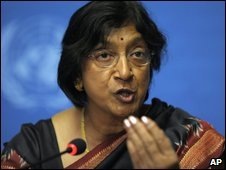 The UN’s high commissioner for human rights has called for an independent investigation into alleged atrocities by both sides in Sri Lanka’s civil war.
The UN’s high commissioner for human rights has called for an independent investigation into alleged atrocities by both sides in Sri Lanka’s civil war.
Navi Pillay said it was the only way to build a sustainable peace in Sri Lanka.
Her comments to the UN’s Human Rights Council in Geneva come amid growing concern for more than 250,000 civilians now living in government-run camps.
Sri Lanka has rejected Ms Pillay’s demands and has called instead for financial aid to rebuild the country.
In her opening speech to the emergency summit, Ms Pillay said there were "strong reasons to believe that both sides have grossly disregarded the fundamental principle of the inviolability of civilians".
She said an "independent and credible international investigation" should be carried out to establish "the occurrence, nature and scale of violations of international human rights and international humanitarian law, as well as specific responsibilities".
"Establishing the facts is crucial to set the record straight regarding the conduct of all parties in the conflict," she said.
"Victims and survivors have a right to justice and remedies."
Her comments were echoed by the UN’s Under Secretary for Humanitarian Affairs John Holmes, who told the BBC an investigation was essential if the country was to move forward.
Mr Holmes said the Tamil Tigers (LTTE) had used civilians as human shields "in the most cynical and brutal way", but that civilians had also been "affected very badly" by being caught up in army shelling.
‘Outrageous’
The rights council’s special session is considering two different draft resolutions.
One put forward by 17 European and Latin American countries calls on the Sri Lankan government to investigate allegations of rights abuse and for aid agencies to have greater access to displaced people.
But Sri Lanka has drafted its own document calling for UN co-operation in providing humanitarian aid.
Its resolution cites the "principle of non-interference" in states’ internal matters and says it is addressing the needs of civilians.
Sri Lanka’s ambassador to the UN, Dayan Jayatilleka, said it was "outrageous" to suggest that the government should be investigated.
The BBC’s Imogen Foulkes in Geneva says it appears that the widespread allegations of violations are not being seriously addressed at the meeting, much to the frustration of rights groups and Ms Pillay.
The end result of the session is likely to be a bland and consensual resolution which does not demand much action from anyone, says our correspondent.
Cramped conditions
Ms Pillay has also called for journalists and human rights monitors to be given access to the camps for internally displaced people.
The Sri Lankan army is currently controlling the closely-guarded camps and there is concern about the poor conditions in which up to 300,000 people are now living.
The BBC’s Ethirajan Anbarasan was taken by the Sri Lankan military to two camps housing tens of thousands of displaced people.
He said conditions in one camp were very basic, with people complaining of a lack of water, proper food and sanitation.
At another camp – also run by the military – conditions were better, although still cramped.
The government has said it is addressing the problems but has also accused the rebels of infiltrating the camps.
The Tigers’ defeat has almost brought to an end their 26-year fight for a separate Tamil homeland with most senior leaders believed to have been killed in recent weeks.
But Daya Mohan, head of the political wing of the LTTE in the eastern district of Batticaloa, told the BBC Tamil service that the remaining fighters in the east were not thinking of surrendering.
He said the groups were "capable of carrying out guerrilla attacks" and were waiting for a decision from their leadership.
(For updates you can share with your friends, follow TNN on Facebook and Twitter )
